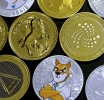Top 5 Graphic Models for Cryptocurrency Traders

Top 5 Graphic Models for Cryptocurrency Traders
The evolution of cryptocurrency trading has brought about an era where understanding the subtle intricacies of market behavior is essential for success. As traders navigate through this volatile landscape, graphical models serve as vital tools, offering a visual interpretation of market dynamics. They are not just charts; they are narratives of the ongoing tug-of-war between buyers and sellers, each with its own unique language of peaks, troughs, and patterns that can signal potential future movements.

Top 5 Graphic Models for Cryptocurrency Traders
The Line Chart: Simplicity and Clarity for Trend Analysis
The line chart is the epitome of simplicity in a complex market environment. By connecting closing prices over a specified period, it offers a clear trajectory of a cryptocurrency’s performance. Its uncluttered nature allows traders to identify overarching trends at a glance, providing an efficient way to assess long-term price movement without getting bogged down in short-term volatility. It is the map that guides through the hills and valleys of price action, offering traders a baseline from which to dive deeper into the more intricate aspects of analysis.Candlestick Chart: A Detailed View of Market Sentiment and Price Movements
Originating from 18th-century Japan, the candlestick chart has stood the test of time and is now a cornerstone in crypto trading analysis. Each ‘candle’ encapsulates four crucial pieces of information: opening price, closing price, high, and low within a specific time frame. This rich data bouquet provides insights into market sentiment by painting detailed pictures that predict potential reversals or continuation patterns like ‘doji’, ‘hammers’, and ‘bullish engulfing’. This chart not only tells us where prices have been but often indicates where they are heading with visceral immediacy.Bar Chart: An Alternative Representation of Price Action for Traders
Bar charts share similarities with candlestick diagrams but present information with even more minimalism. Each bar represents trading activity over a given period, marked by vertical lines depicting price range while small horizontal ticks exhibit opening and closing prices on both sides. Some traders prefer bar charts over candles as they provide a less cluttered view while still maintaining detailed information about price movements – giving investors another lens through which to formulate their strategies.Point & Figure and Renko Charts: Unique Perspectives on Price Volatility and Trends
Point & Figure (P&F) charts eschew time-based information entirely, focusing purely on price movements that exceed predetermined thresholds—a method that filters out minor fluctuations to highlight only significant shifts in market sentiment. Similarly, Renko charts prioritize price change over time and volume by utilizing bricks that represent fixed price movements; new bricks are only formed when prices move by a certain amount. These charting techniques offer distinct advantages by removing what some consider ‘noise’, enabling traders to concentrate solely on substantial changes that could dictate substantial trends.In conclusion, while cryptocurrency markets may seem unpredictable at first glance – patterns do emerge that can be deciphered using these various graphical models. From the straightforwardness of line charts to the complexity seen in candlesticks or the distinct focus on price found in P&F or Renko charts—each model provides different insights into market behavior for informed trading decisions in this digital asset class.
Cryptocurrency trading, Graphic models, Technical analysis, Financial markets, Trading strategies
Cryptocurrency trading, Graphic models, Technical analysis, Financial markets, Trading strategies














Report
My comments